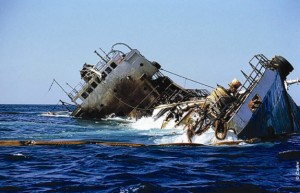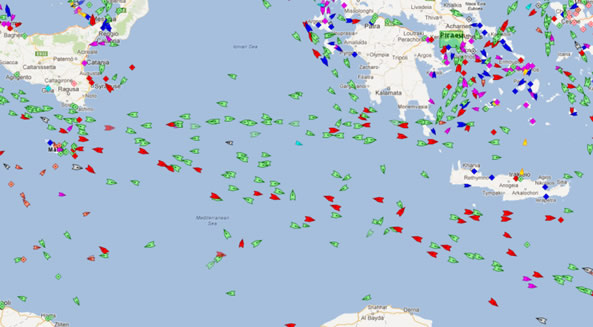 Although the Mediterranean Sea makes up less than 1% of the global marine surface, it sees 20% of the global tank ship maritime traffic. This traffic inevitably means numerous cases of oil pollution at sea, sometimes severe, not to mention pipeline or oil terminal accidents (EEA, 2006). The well-documented events of Prestige in 2002 and BP Deepwater Horizon in 2010 have widely and conclusively demonstrated that an efficient forecasting system is necessary in order to manage similar emergency situations.
Although the Mediterranean Sea makes up less than 1% of the global marine surface, it sees 20% of the global tank ship maritime traffic. This traffic inevitably means numerous cases of oil pollution at sea, sometimes severe, not to mention pipeline or oil terminal accidents (EEA, 2006). The well-documented events of Prestige in 2002 and BP Deepwater Horizon in 2010 have widely and conclusively demonstrated that an efficient forecasting system is necessary in order to manage similar emergency situations.
The Mediterranean project MEDESS-4MS (Mediterranean Decision Support System for Marine Safety; www.medess4ms.eu) is co-financed by the European Regional Development Fund (ERDF) through the MED Programme for the period 2012-2015. In this project, the Department of Merchant Shipping (DMS) of Cyprus coordinates the activities of 20 partners from 7 Mediterranean countries plus REMPEC, among which the Italian Coast Guard (ITCG), the National Research Council (CNR) of Italy, and the International Ocean Institute – Malta Operational Center (IOI-MOC) at the University of Malta.
The main service delivered by MEDESS-4MS will be an integrated real time operational oil spill forecasting service for the Mediterranean for the national response agencies REMPEC and EMSA. The multi-model oil spill forecasting system is composed of environmental information from the GMES Marine Service and the national ocean forecasting systems interfaced with oil slick data from existing monitoring platforms from EMSA CSN, as well with AIS data. It will use real-time information about oil slick positioning and interface it with oil spill models which are capable of forecasting the movement of the pollution, thus providing tailored products to oil spill crisis management users. This will contribute substantially to maritime risks prevention and maritime safety.

The service will be accessible through a User Interface which will be made up of a web portal on which the MEDESS-4MS services will be made available. The system will be capable of being accessed by different user categories and will thus implement authentication services, profiling, management of customized contents and centralized administration.
Users will have the possibility of choosing the MEDESS-4MS oil spill model that best satisfies their local or sub-regional needs, and of selecting the necessary forcing data from the output of local, sub-regional and regional ocean and meteorological forecasting systems.
MEDESS-4MS Service Scenarios
The MEDESS-4MS services will be delivered through 3 service scenarios (SS), in order to assist operational response agencies:
SS1- Real time interactive oil spill predictions by the end-user request. An automatic system that will run after an oil spill alert from satellite data. This scenario will be used by selected authorized users (i.e. official agencies of Member States).
SS2-Delayed mode simulations by end-user request. In this solution, intended for the use of REMPEC and generic users, the UI provides the means to access the monitoring component, environmental data and model outputs and to receive integrated remote/in-situ data. The user will query the NDR Service to consult historical data for study or statistical purposes, and possibly query the NDR to back-trace data with the aim of identifying possible polluting ships.
SS3-Decision support system (DSS) to manage emergency operations. The services will consist of a DSS that will be an operational tool proposing a set of possible scenarios to the users, developed according to the foreseeable meteo-marine conditions and the possible on-site interventions. The DSS will then be used for oil spill crisis management and will be built upon a set of simulation functionality, launched by the UI to support the work of operational decision makers. This last SS also includes the work dedicated specifically to supporting REMPEC.
Partners have established the Emergency Response Office (ERO) to serve as the coordinating body for the MOON ERO experts who provide oil spill monitoring and forecasting bulletins, including meteo-oceanographic forecasts, to REMPEC to support it in emergencies operations management. The ERO system will be developed further in MEDESS4-MS and the ERO bulletin maker user-interface will be created to allow the system to automatically produce the ERO bulletin based on the input of the ERO experts.
References and links
EEA (European Environment Agency): Priority issues in the Mediterranean environment, EEA Report no. 4, 88 pp., 2006.
MEDESS-4MS site: http://www.medess4ms.eu

